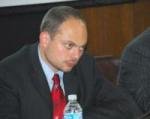
By Vladimir Kara-Murza
This week brought a potential breakthrough in the investigation of Russia’s most high-profile political murder in recent memory, the 2015 assassination of opposition leader Boris Nemtsov — or, rather, it would have, if Russian law enforcement had any intention of investigating it seriously. The announcement, in fact, was made not in Moscow but to the west, in Luxembourg, where the Parliamentary Assembly of the Organization for Security and Cooperation in Europe (OSCE) met for its annual session and held its first hearing on the Nemtsov case.
Among other materials made public at the Luxembourg hearing was a transcript of sworn testimony by Akhmed Zakayev, a former deputy prime minister of Chechnya who now lives in exile in London. The testimony had been obtained by Vadim Prokhorov, the lead attorney for Nemtsov’s family, and submitted to the Russian Investigative Committee, along with Zakayev’s contact information. Predictably, it refused to pursue it — because, according to the official response, Zakayev’s statements “do not offer any further details of the criminal offense committed.”
Officials from the OSCE — the organization tasked with monitoring European security — seem to think otherwise. In his testimony, Zakayev recounts that, in early 2012, he received information from a trusted source in “the inner circle of Ramzan Kadyrov and Adam Delimkhanov” (respectively, the Kremlin-backed leader of Chechnya and Chechnya’s representative in the Russian parliament) that Kadyrov had been tasked with organizing the murder of Boris Nemtsov. According to Zakayev’s source, the order came directly from then-Prime Minister Vladimir Putin and his head of security, Viktor Zolotov, on their visit to Chechnya in December 2011.
That was a tumultuous time in Russia, with the largest opposition demonstrations since the start of Putin’s rule as tens of thousands took to the streets of Moscow to protest blatantly rigged parliamentary elections and to demand reforms. The outburst of public anger came as a shock to Putin, and it was known at the time that, alongside offering some modest concessions to the protesters, the Kremlin was preparing to use force against them. The measures included bringing armed formations of Kadyrov’s Chechen troops to Moscow.
Contemporary news accounts confirm that Putin was in Chechnya on Dec. 20, 2011 — 10 days after the 100,000-strong opposition rally on Bolotnaya Square and four days before an even bigger one on Sakharov Avenue. Dec. 20 also marks the anniversary of the founding of the Soviet KGB, one that Putin usually spends celebrating with his former colleagues in Moscow. Instead, according to terse media reports, he went to Chechnya to chair a meeting on “the socio-economic development of the North Caucasus.” According to Zakayev’s source, the real reason was to discuss the use of Kadyrov’s troops against the demonstrators in Moscow and “the plan to eliminate” Nemtsov.
“I treated those reports most seriously as the source was highly reliable … and the information it had provided earlier was confirmed on multiple occasions,” Zakayev said in his testimony. In February 2012 he met with Nemtsov in Oslo to warn him, but got the impression that the Russian opposition leader “did not fully believe such a development was possible.” In Zakayev’s view, the murder was postponed because Putin, after his formal return to the Kremlin in 2012, “still hoped to improve relations with Western countries.” With the annexation of Crimea and the start of the war in Ukraine in 2014, any such hope was futile — “and the plan was executed.”
It is worth recalling that the convicted gunman in the Nemtsov murder case — Lt. Zaur Dadayev of the Russian Ministry of the Interior troops — served in Chechnya under the command of both Zolotov and Kadyrov. As stated in a recent Council of Europe report, it is “extremely unlikely” that he could have carried out such a complex and high-profile crime “without at least the foreknowledge and approval of, if not direct instructions from, … hierarchical superiors.” The killers’ ties to Kadyrov have been highlighted in U.S. congressional resolutions and the U.S. government’s designation of a close Kadyrov confidant for sanctions under the Magnitsky Act. With Zakayev’s testimony, the chain of responsibility seems to be confirmed by a source in Kadyrov’s own entourage — and, for the first time, extended upward to Putin himself. Needless to say, in the four years since the murder, Russian investigators steadfastly refused to move beyond the immediate perpetrators, with the top investigative official declaring the Nemtsov case to be “solved.”
This, indeed, is why international oversight became necessary. “In a society governed by the rule of law, the political opposition is equally protected,” Margareta Cederfelt, the Swedish vice president of the OSCE Parliamentary Assembly and its rapporteur on the Nemtsov case, said at the hearing in Luxembourg. “When … justice and the protection of democratic rights cannot be sought at the national level, the international community must engage.” According to her mandate, Cederfelt has until July 2020 to prepare and submit her final report. The reelection of the OSCE Parliamentary Assembly’s president, George Tsereteli, who defeated a Kremlin-backed candidate, ensures that the oversight process will be completed.
International oversight is a poor substitute for a real investigation, just as the Magnitsky Act sanctions are a pale shadow of real justice. But while Russian authorities continue to engage in a coverup, international organizations must take the lead to ensure at least some measure of accountability — and to bring us one small step closer to the day when all of those behind the murder of Nemtsov stand before a court of law in Russia.
























